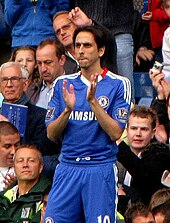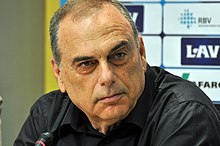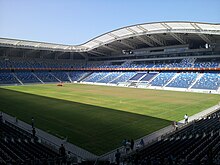Shipping from Europe with tracking number
Israel national football team
 | |||
| Nickname(s) | הכחולים-לבנים (The Blue and Whites) | ||
|---|---|---|---|
| Association | Israel Football Association (IFA) | ||
| Confederation | UEFA (Europe; 1994–present) AFC (Asia; 1954–74) | ||
| Head coach | Willibald Ruttensteiner | ||
| Captain | Bibras Natkho | ||
| Most caps | Yossi Benayoun (102)[1] | ||
| Top scorer | Mordechai Spiegler (33)[2] | ||
| Home stadium | Teddy Stadium (Jerusalem) Sammy Ofer Stadium (Haifa) Turner Stadium (Beersheba) | ||
| FIFA code | ISR | ||
| |||
| FIFA ranking | |||
| Current | 88 | ||
| Highest | 15 (November 2008) | ||
| Lowest | 99 (January 2018) | ||
| Elo ranking | |||
| Current | 63 | ||
| Highest | 23 (April 1976) | ||
| Lowest | 81 (December 1959) | ||
| First international | |||
| Mandatory Palestine (Eretz Israel): (Cairo, Egypt; 16 March 1934) Israel: (New York, United States; 26 September 1948) | |||
| Biggest win | |||
(Wellington, New Zealand; 23 March 1988) | |||
| Biggest defeat | |||
| Mandatory Palestine (Eretz Israel): (Cairo, Egypt; 16 March 1934) Israel: (Kaiserslautern, Germany; 12 February 2002) | |||
| World Cup | |||
| Appearances | 1 (first in 1970) | ||
| Best result | Group stage (1970) | ||
| Asian Cup | |||
| Appearances | 4 (first in 1956) | ||
| Best result | Champions (1964) | ||
The Israel national football team (Hebrew: נבחרת ישראל בכדורגל, Nivḥeret Yisra'el BeChaduregel) represents Israel in international football, and is governed by the Israel Football Association (IFA).
Israel's national team is the direct successor of the Mandatory Palestine (Eretz Israel) national football team, which played five internationals in 1934–1940, and was managed by the Eretz Israel Football Association. Israel football is a part of the UEFA since 1994 as well.
The Israeli side qualified for their only FIFA World Cup to date in 1970.
History
Football has a long tradition in Israel. The game was originally introduced during the time of the Ottoman Empire. The Palestinian Football Association was formed in August 1928, and joined FIFA in June 1929, but at the time the association was made up of Arab clubs, Jewish clubs, and clubs representing British policemen and soldiers serving in the region during the British Mandate rule that spanned the period between World War One and the creation of the State of Israel in 1948. The British Mandate of Palestine national team made its debut against Egypt in 1934 FIFA World Cup qualification, losing 1–7 in Cairo. The team played five international matches, including a friendly match against Lebanon, until the British Mandate for Palestine was dissolved. During those five games, the national team fielded only Jewish players. Three anthems were played before each match: the British "God Save the King", the Jewish (and future Israeli) "Hatikvah" and the opposing team's anthem.[5]
In 1948 the team became, officially, the national team of Israel. The Israel national team's first match as an independent nation was on 26 September 1948, against the US Olympic Team. The game was won by the US 1–3, and in the 20th minute of the game Shmuel Ben-Dror scored the first goal after the creation of the State of Israel.
Asian Football Confederation membership
Israel competed in the Asian Football Confederation (AFC) between 1954 and 1974. Due to the Arab League boycott of Israel, several Muslim countries refused to compete against Israel. The political situation culminated in Israel winning the 1958 World Cup qualifying stage for Asia and Africa without playing a single game, forcing FIFA to schedule a playoff between Israel and Wales to ensure the team did not qualify without playing at least one game (which Wales won).
Israel hosted and won the 1964 AFC Asian Cup. In 1968, Israel went to their first Olympic Games and lost to Bulgaria in the quarterfinals.
In 1969, Israel qualified for its first and only FIFA World Cup, via Asia/Oceania, and earned two points after draws with Sweden and finalist Italy, and a loss to Uruguay.
In 1976, Israel went to its second Olympic Games and lost in the quarterfinals again, this time against Brazil. In 1972 and 1977, it attempted World Cup qualification as part of Asia, which both times ended in failure.
Years in exile
In 1974, Israel was excluded from AFC competitions, as a result of a proposal by Kuwait which was adopted by a vote of 17 to 13 with 6 abstentions.[6] The vote coincided with the 1974 Asian Games, where the football competition was marred by the refusal of both North Korea[7] and Kuwait to play second-round matches against Israel.
During the 1980s, it played the majority of its matches against European teams, and competed in the European stage of qualification for the 1982 FIFA World Cup. For the next two tournaments, it entered Oceania's qualification stage. In 1989, Israel made it to the CONMEBOL–OFC play-offs for the 1990 World Cup to play against Colombia, which qualified from the South American group, but lost (1–0, 0–0).
UEFA membership
In 1991, Israeli clubs began participating in European club competitions, and Israel returned to the European leg of World Cup qualifying in 1992. In 1994, Israel received full UEFA membership, 20 years after it had left Asia. Within Europe, Israel has been a relatively minor nation, though with some successes, notably winning 3–2 in Paris against France in 1993, and 5–0 against Austria in 1999. That year, Israel made it to the UEFA Euro 2000 qualifying play-offs, but was beaten by Denmark.
Israel came close to advancing to the playoff stage in their 2006 World Cup qualifying group, finishing third, behind France, and tied on points with Switzerland, which also remained unbeaten in 10 matches after 4 wins and 6 draws. The Swiss had a better goal difference, though, and advanced to the qualification play-off. Coach Avram Grant announced his resignation on 26 October 2005. After the end of his contract, he was succeeded by Dror Kashtan.
In UEFA Euro 2008 qualifying, Israel came very close to qualifying for the final tournament, but finished fourth in Group E, just one point behind second-placed Russia, who qualified directly with Croatia, and level on 23 points with England, who also failed to advance. The 4–3 home loss to Croatia was the first loss after 13 consecutive official games and 9 home games without a loss.
In 2010 FIFA World Cup qualification, Israel again came in fourth, behind Switzerland, Greece, and Latvia. For the UEFA Euro 2012 qualifying campaign, Kashtan was replaced as coach by Frenchman Luis Fernández, but to no avail, as Israel finished a distant third behind Greece and Croatia.
The continued presence of the Israeli Football Association in UEFA was a precedent cited by Australia to justify its transfer from the Oceania Football Confederation to the Asian Football Confederation.[8]
All-time head-to-head record
As of 4 September 2020.
Positive record Neutral record Negative record
| showOpponents | Pld | W | D | L |
|---|
- ^ Includes matches against
 West Germany.
West Germany. - ^ Includes matches against
 Soviet Union.
Soviet Union. - ^ Includes matches against
 Yugoslavia and
Yugoslavia and  Serbia and Montenegro.
Serbia and Montenegro. - ^ As
 South Vietnam.
South Vietnam.
Home stadium
In the past, the Israel national football team's home stadium was the Ramat Gan Stadium in the Tel Aviv District city of Ramat Gan. The stadium seats 41,583 and was the first stadium in Israel to meet world-class standards.
Ever since 2014 Sammy Ofer Stadium in Haifa (30,780 seats), ever since 2015 Teddy Stadium in Jerusalem (34,000 seats), and ever since 2018 Turner Stadium in Beersheba (16,126 seats), are being used as the official home stadiums of the Israel national football team. All three are considered to be world-class standard stadiums. The Israel Football Association has used Teddy stadium while hosting the 2013 Euro U21 championship in Israel.
Kit suppliers[edit]
| Kit supplier | Origin | Period |
|---|---|---|
| Diadora | Italy | 1992–1995 |
| Adidas | Germany | 2008–2018 |
| Puma | Germany | 1985–1989, 1996–2008, 2018–present |
Honours
- Silver medalists (1): 1974







